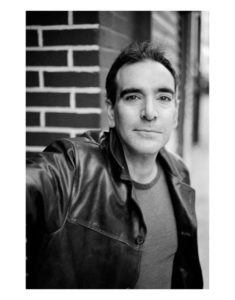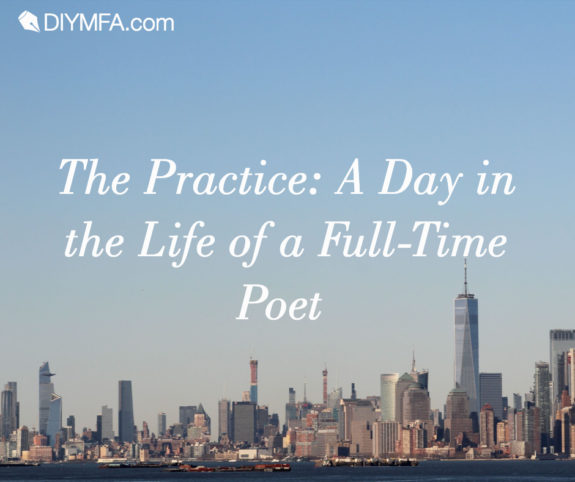As a full-time poet I work on my own poetry at least eight hours each day. This work includes raw creation from scratch and revision. In the past, I also counted literary translation of poetry but I am focusing on my own work now. Many of my writer friends (and all the poets) ask, “How do you do it?” They mean, primarily, financially, as in, “How do you pay the rent?” But they are also asking how I manage to fit poetry into a 9-5 box.
Here is an average weekday in my life as a poet:
Around 7 am, I walk from my apartment in the Lower East Side to my writing space, Paragraph, on 14th St, collecting impressions of the city along the way. I have been reading lots of image-rich Classical Chinese poetry in translation and am slowly building up a collection of my own Chinese-influenced poems based on urban images for my next book. New York City is my great love, and I try to take a different route each day.
Good Morning!
Humming, I celebrate another dawn.
All that I witness, sash
lifted, has panache
and purpose: steam and trash
rise up with jubilance;
the courts New Yorkers keep in lieu of lawn
are launchpads for romance,
as day comes on.
Even the rats are skittering
with special, light
skritterings, like they all
got laid last night.
I hear the backed-up traffic sing
obscenities and honks
from Chelsea to the Bronx.
My friends, I hear the call,
yes, I repeat the call:
“Let’s do this thing!”
Open 24 hours, Paragraph is a “WeWork” for writers. There is a climate-controlled quiet room, where aspiring and established novelists and memoirists, along with a few editors, peck away at their keyboards. There is a café area with various sources of caffeine and a fridge. In order to feel “legit” as a full-time writer and poet, I need this special space outside of my apartment, a kind of office to which I can go from 9-5 and beyond.
When I arrive at Paragraph I devote a half hour to an hour to “business and publicity,” which mostly means responding to emails (fan-mail, hate-mail, contracts and promotional copy) and posting on Facebook and Twitter.
To get myself in the mood for creativity, I lose myself for a time in poetry that I find stimulating, often Chinese poetry in translation or poetry by Auden. Then I get to work.
I start with fragments—phrases or lines that I find striking. I combine them in different ways in search of a spark. Have you ever gone camping and tried to start a fire by rubbing two sticks together? That’s the analogy I want here. The phrases and lines are the sticks, and I rub them together until the fire that is a poem is enkindled.
Some days I end up with a poem I want to keep; some days I end up with nothing.
Here’s another analogy: fishing. Some days the fish are biting; some days, not. Be philosophical. Don’t despair if you write for hours and come up with bupkis. Tomorrow may well be better.
When I need a break from raw and active creativity, I turn to revision. I print out several poems that I have recently written and do everything I can in terms of word-substitution, expansion and contraction in an attempt to push them to their “perfect” iteration.
Remember that, rather than being opposed to the creative process, editing is a fecund part of it. Every little problem, every little annoyance in a poem needs to be ironed out before it can be submitted, and the solutions that come to me in revision often make the poem stronger than it was before by pushing it in a new direction or providing the click that makes it a satisfying Gestalt.
I grew up as a poet when I fell in love with the reader. Whereas Jonathan Franzen says the novelist should think of the reader as a friend, I say the poet should think of the reader as someone he/she wants to make out with. A poem is an act of seduction. I know a poem of mine is done when I can I imagine myself whispering it, with confidence, like a sweet nothing, into someone’s ear:
Only Connect
A lonely soul, I know,
as earth and the years revolve,
flirtations come and go
and earnest vows dissolve.
The love I meant I marred.
Now all that’s left is my will
to catch your ears off guard,
to broach and breach until
my folderol gets through.
Let me in, please, with you.
I suppose I should answer what everyone is thinking—how do you afford this life in NYC? Some money does come from my original stuff in the form of prize money or payments for publications but, I confess, far more of my very modest living comes from translation and teaching.
I encourage translation because, yes, it can bring some money in, but also because it works as a craft exercise that pushes a writer to find a different voice and idiom. Here’s some advice: if you are going to translate something, translate something in the public domain so that, say, Euripides isn’t around to collect a share of the royalties.
Also, think about translating a play because you can, for example, sell the printing rights and retain the stage rights. That way, whenever a theater company wants to produce your translation, it has to pay a certain amount for each performance. Multiple revenue streams.
Teaching, for me, comes as naturally as breathing. The trick with a “side hustle” is to keep it on the side, that is, make sure it doesn’t take away from writing time. I try to schedule classes for late afternoon or early evening, so that my block of creative time remains intact.
Then, at the end of the day, I print out the day’s creations so that I can take them on the road and keep fiddling with them.
Usually around 6pm, now that the city is not locked down, I walk for a drink or two in the East Village. I find that a few drinks allow me to “get some distance” and “a new brain” on the day’s work. Yes, I am the guy you see at the bar scribbling on sheets of paper.
Oh then the happy hours
when a serene bartender
pours tequila, mixer
and ice into a blender
to make a soothing elixir.
Ease has a salty flavor.
After a sultry day’s
bright blurriness, we savor
another sort of haze.
I then walk home and, if I am in the mood, continue working with the material I had composed earlier in the day. If I am not in the mood, I revise some more in bed or re-read work by a favorite poet or two.
Then I go to sleep and get up and do it all over again.

Aaron Poochigian is a renowned poet, author, translator and lecturer. He earned a PhD in Classics from the University of Minnesota and an MFA in Poetry from Columbia University. His first book of poetry, The Cosmic Purr (Able Muse Press), was published in 2012, and his second book Manhattanite, which won the Able Muse Poetry Prize, came out in 2017. His thriller in verse, Mr. Either/Or, was released by Etruscan Press in the fall of 2017. A recipient of an NEA Grant in translation, he has published translations with Penguin Classics and W. W. Norton. His latest book, “American Divine,” came out in 2021. His work has appeared in such publications as Best American Poetry, The Paris Review and POETRY.
You can find him on his website, or follow him on Twitter.







